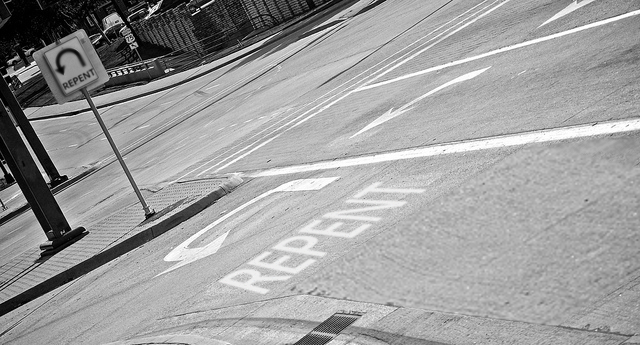A while back, my friend Ed wrote a post explaining that repenting means more than simply feeling sorry for sin. It implies turning away from sin – it implies honestly rejecting, in our minds, our actions as ungodly and resolving not to do them again. Of course, we fail again and again, but when we repent, our minds and hearts should be fully intent on turning, once and for all, away from sin and towards God.

Photo: bradleypjohnson, reused under CC license
Or should it?
I have a simple problem with that. It suggests we can reach that state on our own. It suggests that being genuinely sorry (and I’m not talking about acting on that change of heart – I’m talking about being sorry in and of itself) is something we can and should do in our own strength. Only then, only after we have taken the decision to repent, are we then able to welcome Jesus.
But that’s not the pattern we see, on multiple occasions, in the Bible. The paralytic wanted to get healed, not to repent of his sins. Zacchaeus wanted to see Jesus, that’s why he ran ahead of the crowd – not because he had had a change of heart. Again and again, you don’t see people going ahead to Jesus after they’ve had a change of heart; rather, it is after they’ve come into Jesus’s presence that they do.
I’m sure you can start to see the problem. We’ve managed to understand that we don’t have to be squeaky clean in our actions before we can turn to Jesus, yes, but we still believe that we have to be squeaky clean in our intentions. It’s right there, in the baptismal promises. And that is a barrier to our true repentance – because just like we can’t be squeaky clean in our actions on our own, we can’t be squeaky clean in our intentions on our own.
Oh, for the casual, little sins, we’re okay thinking “oh, well, I won’t do that again.” For the big sins, too, the first time we see them for what they are. But after failing after failing after failing to act righteously for that particular sin, it gets difficult to even face it. It gets impossible to even want to change it. Because we haven’t realised even our intentions we have surrendered to Jesus.
What if, when John the Baptist said “Repent, for the kingdom is near“, he didn’t mean to warn us of impending doom, but of a new possibility? “Repent: now you can, see, the kingdom is near.”
